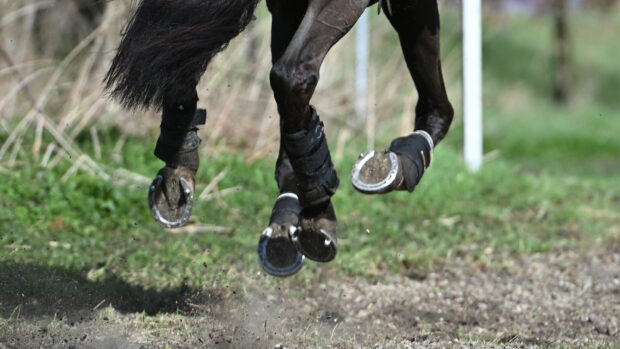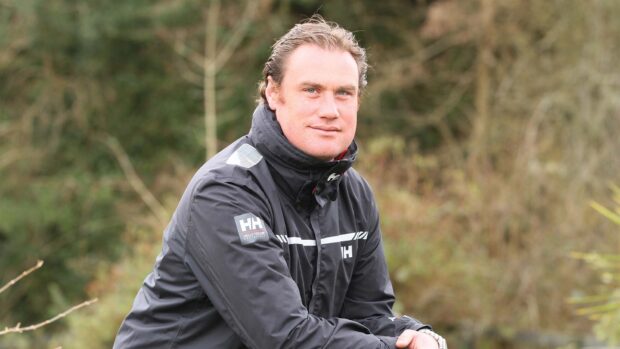Meet Trooper, Greater Manchester Police’s (GMP) newest equine recruit, an 18.2hh part-bred Shire who is settling in well to life in the mounted branch.
Trooper, 11, has passed his initial assessment with flying colours, and is now comfortably installed, enjoying turnout and his “penthouse suite” extra-large stable, as the biggest police horse in the country.
GMP stable manager Claire Hamer told H&H about Trooper, and the training all equine recruits undertake.
“He’s one of the biggest police horses nationally for a long time,” she said. “He’s a gentle giant, and he likes people.”
Trooper came from the Cumbrian Heavy Horses riding centre, from which the mounted unit has bought horses before.
“When we advertise for horses, we usually look for those aged six to 10, so they’ve been backed and ridden away,” Claire said. “With Trooper’s sort of breed, they may not have done any intensive work but they’ve hacked out and seen a bit, and the temperament is there.”
The unit recruits heavy horses such as Trooper, but not exclusively, Clare explained.
“We do have sport horses; we have to have that type for the officers to train with, walk, trot, canter and jumping, and we also have the Trooper type, who are steadier, quicker to train and more predictable, dare I say,” she said. “The sport horses tend to be quirkier, and definitely have their own opinions on a lot of things, which keeps us on our toes! And it makes us better riders.”
As is always the case with potential recruits, Trooper arrived for a long trial first. This can be an obstacle in some sales, Claire said, as the unit likes to try horses for four to eight weeks to ensure they are right for the job.
Trooper arrived in early December and the unit assessed him against various criteria. One issue was that he was “not very happy about loading”, and as the police horses travel frequently to their patrols, this was an issue. But with the unit’s approved and research-backed training techniques, he was soon happy to get on the lorry.
Lots of groundwork followed – the horses are taught to “park” as one key skill.

“The ultimate aim is to be able to park the horse in the arena, leave and go and make a coffee,” Claire said. “That’s really important if, for example, an officer is left with two horses when the other has to get off, maybe to arrest someone.”
Trooper was ridden by different trainers, and his responsiveness and reaction to different stimuli was assessed.
“We look at attitude to visual hazards, from different directions and at different heights,” Claire said. “We’re not looking for a horse who doesn’t react; they’re horses, we expect reactions, we’re looking for ones who are happier at a closer distance, and the flight instinct doesn’t kick in. There’s no magic wand, it’s about keeping the response at a low level, and keeping them relaxed.”
Trooper was taken out and about; as a former riding school horse, he had seen a lot, with many riders, but in his case the unit had to know he was also independent enough to also be on his own if needed. His relaxation at halt was assessed; Claire said this is very important for police horses.
“Everything was very positive in his first week,” she added. “Manners in the stable, handling, everything. We were a bit concerned the wagons weren’t the right size but we moved the partitions and he’s now travelling happily.”
The unit has horses on patrol every day, and has a presence at events such as football matches.
“Fundamentally, we’re a public-order unit,” Claire said. “We provide support for foot officers in public order or disorder situations, and we’re a preventative measure as spotters, as we’re high up and can see for miles.
“And it’s about public confidence too; we get a lot of people approaching us, and the horses build bridges. I’ve seen people who have had a bad experience with the police and been told they might be hostile but they’ve been friendly to us. We’ve had officers being given intel that wouldn’t be given to other officers.”
The horses also cover more ground, and areas that cars cannot reach.
Trooper will now settle into his routine, with patrols most days, turnout, and two days off a week. This summer, he will tour empty football stadiums, to get him accustomed to that environment, and may take part in some school visits.
“Hopefully he might go to some concerts at the end of the summer too,” Claire said. “He’s a very patient horse; more whoa than go, and very trusting; he might stop and look at something, but then he looks to his handler.
“We’ve had to go up a rug size, and the farrier has his work cut out! We’ve taken the walls down between some of the stables to give more room, and he’s got one of those penthouse suites.
“It’s a privilege to do this role, and there are a lot of passionate people in the unit. The horses really enjoy it too. The only problem with some is that we struggle to retire them as they love the job.”
You might also be interested in:

One-tonne police horse helps arrest man with knife in last week of distinguished career

‘Gallop pain-free, sweet girl’: farewell to grey Shire who led The Queen’s funeral procession

‘I stay because of my love of horses’: mounted police officer clocks up 50 years’ service

Subscribe to Horse & Hound magazine today – and enjoy unlimited website access all year round
Horse & Hound magazine, out every Thursday, is packed with all the latest news and reports, as well as interviews, specials, nostalgia, vet and training advice. Find how you can enjoy the magazine delivered to your door every week, plus options to upgrade your subscription to access our online service that brings you breaking news and reports as well as other benefits.




